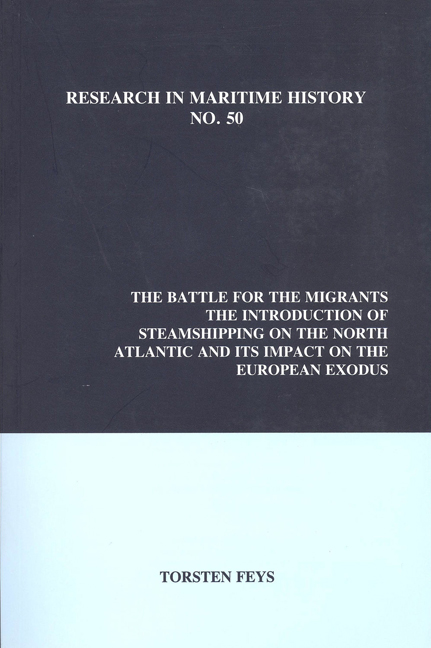 The Battle for the Migrants
The Battle for the Migrants Book contents
- Frontmatter
- Contents
- About the Author
- Acknowledgements
- Figures and Tables
- Introduction
- Part I State Policies and Their Influence on the Connections between Maritime and Migration Networks, 1830-1870
- Part II The Impact of Steam Shipping on Transatlantic Migration, 1870-1914
- Chapter 1 The Role of Middlemen
- Chapter 2 Competition and Collusion: The Growing Pains of Passenger Shipping Conferences
- Chapter 3 The IMM Merger and Further Consolidations in the Shipping Industry
- Chapter 4 The Nationalization of American Migration Policies and the Visible Hand of the Shipping Lobby
- Chapter 5 Shipping Companies' Interference with the Enactment and Implementation of Immigration Laws during the Progressive Era
- Conclusion
- Appendices
Chapter 2 - Competition and Collusion: The Growing Pains of Passenger Shipping Conferences
from Part II - The Impact of Steam Shipping on Transatlantic Migration, 1870-1914
- Frontmatter
- Contents
- About the Author
- Acknowledgements
- Figures and Tables
- Introduction
- Part I State Policies and Their Influence on the Connections between Maritime and Migration Networks, 1830-1870
- Part II The Impact of Steam Shipping on Transatlantic Migration, 1870-1914
- Chapter 1 The Role of Middlemen
- Chapter 2 Competition and Collusion: The Growing Pains of Passenger Shipping Conferences
- Chapter 3 The IMM Merger and Further Consolidations in the Shipping Industry
- Chapter 4 The Nationalization of American Migration Policies and the Visible Hand of the Shipping Lobby
- Chapter 5 Shipping Companies' Interference with the Enactment and Implementation of Immigration Laws during the Progressive Era
- Conclusion
- Appendices
Summary
The introduction of steamships had a major impact on the carriage of goods and people in the Atlantic world. Organizational and technological improvements led to sharply decreased freight rates. Jeffrey Williamson, Kevin O'Rourke and Timothy Hatton demonstrated that this was the main reason for the convergence of the commodity market before 1914. As well, they highlighted the importance of migration in the development of the Atlantic economy. Unlike freight rates, we have little information on passenger fares, but the figures available indicate that the price for passenger transport stabilized after the transition from sail to steam. This is generally attributed to inter-line agreements known as shipping conferences or rings that mitigated competition and reduced the effects of trade fluctuations in order to regulate prices and market shares. Only during periodic rate wars did rates plummet. Knick Harley and Drew Keeling reconstructed yearly averages for the Cunard Line from Liverpool to New York, showing that rates on the North Atlantic fluctuated between £3 and £6 in the period 1885- 1914. An incomplete series reconstructed by Kristian Hvidt for the same years was in broad agreement. Because rate wars triggered by depressed business conditions did not lead to an increase in the volume of migrants, the influence of transport price on migration flows was minimal.
None of these studies, however, considered how the market was organized or what elements influenced prices on the North Atlantic. While they do mention conferences, they do not discuss their operation or effectiveness. To fill this gap we will analyze the New York Continental Conference (NYCC) which regulated the prepaid and return business, based on its minutes and correspondence between the Holland-America Line (HAL) head agent in New York and the board of directors. These documents allow us to construct a price series of westbound prepaid tickets and eastbound return tickets for the Red Star Line (RSL), Hamburg-America Line (HAPAG) and North German Lloyd (NGL) for the period 1885-1902, and for the HAL from 1883 to 1914. They also provide details on how the conference tried to neutralize internal and external competition. Even more revealing is the head agent's correspondence which provides an inside look at the organization of the passenger business. This is especially important because, as Robert Greenhill noted, the meetings in various European locales left few written records, which helps to explain why the literature on conferences is so sparse.
- Type
- Chapter
- Information
- The Battle for the MigrantsThe Introduction Of Steamshipping On The North Atlantic And Its Impact On The European Exodus, pp. 119 - 162Publisher: Liverpool University PressPrint publication year: 2012


